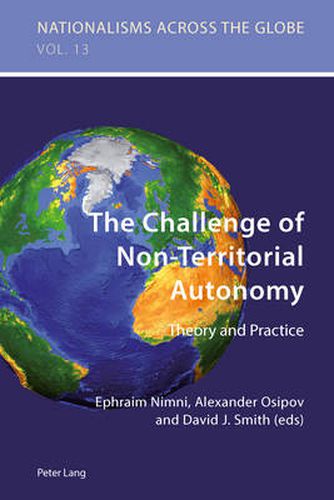Readings Newsletter
Become a Readings Member to make your shopping experience even easier.
Sign in or sign up for free!
You’re not far away from qualifying for FREE standard shipping within Australia
You’ve qualified for FREE standard shipping within Australia
The cart is loading…






This title is printed to order. This book may have been self-published. If so, we cannot guarantee the quality of the content. In the main most books will have gone through the editing process however some may not. We therefore suggest that you be aware of this before ordering this book. If in doubt check either the author or publisher’s details as we are unable to accept any returns unless they are faulty. Please contact us if you have any questions.
This book explores and evaluates non-territorial autonomy (NTA), an important modality of ethnic and religious diversity management. Whereas multicultural liberal democracies sincerely champion equality and individual human rights, they often have considerable difficulty in accommodating culturally diverse minority communities. In most cases, minority communities do not reside within a compact space, making any territorial representation impossible. This brings into focus modalities of NTA as a possible alternative approach. NTA takes a variety of different forms, such as consociationalism or national cultural autonomy, and also encompasses other forms of representation, such as frameworks for accommodating indigenous peoples, juridical autonomy extended to religious communities, or elements of some models of multiculturalism. Using both theoretical and empirical approaches, and also including the work of legal practitioners, the essays within this volume examine the challenges and possible solutions offered by different NTA models for the effective participation of minorities in public life, addressing issues such as the limits and/or possibilities of implementing NTA models in liberal democracies, the extent to which NTA approaches can serve the goals of European integration and the European minority protection framework, and the possible role of NTA in resolving protracted territorial conflicts.
$9.00 standard shipping within Australia
FREE standard shipping within Australia for orders over $100.00
Express & International shipping calculated at checkout
This title is printed to order. This book may have been self-published. If so, we cannot guarantee the quality of the content. In the main most books will have gone through the editing process however some may not. We therefore suggest that you be aware of this before ordering this book. If in doubt check either the author or publisher’s details as we are unable to accept any returns unless they are faulty. Please contact us if you have any questions.
This book explores and evaluates non-territorial autonomy (NTA), an important modality of ethnic and religious diversity management. Whereas multicultural liberal democracies sincerely champion equality and individual human rights, they often have considerable difficulty in accommodating culturally diverse minority communities. In most cases, minority communities do not reside within a compact space, making any territorial representation impossible. This brings into focus modalities of NTA as a possible alternative approach. NTA takes a variety of different forms, such as consociationalism or national cultural autonomy, and also encompasses other forms of representation, such as frameworks for accommodating indigenous peoples, juridical autonomy extended to religious communities, or elements of some models of multiculturalism. Using both theoretical and empirical approaches, and also including the work of legal practitioners, the essays within this volume examine the challenges and possible solutions offered by different NTA models for the effective participation of minorities in public life, addressing issues such as the limits and/or possibilities of implementing NTA models in liberal democracies, the extent to which NTA approaches can serve the goals of European integration and the European minority protection framework, and the possible role of NTA in resolving protracted territorial conflicts.